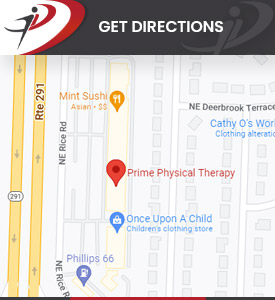Sports Physical Therapist in Lee’s Summit MO
If you participate in sports at any level, you may require physical therapy to treat an injury or improve your performance. Dr. Kyo Hwang and his team of physical therapists at Prime Physical Therapy specialize in caring for active people of all levels, including professional athletes. You’ll be cared for by therapists who know sports and appreciate how important they are to you. For more information, contact us today or book an appointment online. We are conveniently located at 1161 NE Rice Rd Lee’s Summit, MO 64086.


Table of Contents:
Is a sports therapist the same as a physical therapist?
Why is sports therapy important?
What treatments do sports therapists do?
What injuries do sports therapists treat?
A sports therapist and a physical therapist are similar in that they both focus on the rehabilitation and treatment of injuries, but they have some key differences. Physical therapists are healthcare professionals who work with patients to alleviate pain, improve mobility and function, and prevent further injury. They may work with patients of all ages and with a wide variety of injuries and conditions, including musculoskeletal injuries and chronic diseases such as arthritis.
Sports therapists, on the other hand, are healthcare professionals who specialize in the prevention and treatment of sports-related injuries. They may work with athletes at all levels, from amateur to professional, and may be involved in the management of injuries from the initial assessment to the rehabilitation and return to play.
Sports therapy is important for several reasons. It helps prevent injuries by identifying and addressing risk factors that may lead to them. Sports therapists may work with athletes to develop and implement injury prevention programs that focus on strength, flexibility, and conditioning. In addition, sports therapy helps athletes recover from injuries and return to their sport as quickly and safely as possible. Sports therapists work with athletes to develop and implement rehabilitation programs that are tailored to the specific injury and the athlete’s goals.
Sports therapy helps athletes improve their performance by addressing any physical limitations or imbalances that may be affecting their ability to perform at their best. Sports therapists create and implement performance-enhancement programs that focus on strength, power, and conditioning. Overall, sports therapy is important for the overall well-being of athletes. It helps them maintain a healthy lifestyle and continue to enjoy their sport for as long as possible.
Sports therapists use a variety of treatments to help athletes recover from injuries and improve their performance. Some common treatments used by sports therapists include:
● Exercise therapy – Sports therapists use exercise therapy to help athletes regain strength, flexibility, and range of motion following an injury. This may include exercises such as stretching, strengthening, and conditioning.
● Manual therapy – Sports therapists use manual therapy techniques such as massage, mobilization, and manipulation to help alleviate pain and improve mobility.
● Taping and bracing – Taping and bracing techniques are used to support and protect injured joints and muscles.
● Electrotherapy – Sports therapists use electrotherapy modalities such as ultrasound to help reduce pain and inflammation while promoting healing.
● Rehabilitation – Sports therapists work with athletes to develop and implement rehabilitation programs that are tailored to the specific injury and the goals of the athlete.
● Sports-specific training – Sports therapists help athletes to improve their performance by developing and implementing sports-specific training programs that focus on strength, power, and conditioning.
● Nutritional advice – By providing nutritional advice, sports therapists help athletes optimize their performance, recover from injuries and maintain a healthy lifestyle.
● Psychological support – Sports therapists can provide psychological support and resources to help athletes cope with the physical and emotional challenges of injury and return to sport.
This list is not exhaustive, as the treatment will vary depending on the injury and the sports therapist’s approach. Additionally, sports therapists may work closely with other healthcare professionals, such as doctors and physical therapists, to provide the most comprehensive care possible.
Sports therapists treat a wide variety of injuries that can occur in athletes of all levels and in all types of sports. Some common injuries that sport therapists treat include:
● Musculoskeletal injuries – Injuries to the bones, muscles, tendons, and ligaments are considered musculoskeletal injuries. Common examples include sprains, strains, fractures, and dislocations.
● Overuse injuries – These are injuries that occur as a result of repetitive motions or overtraining. Common examples include tendinitis, bursitis, and stress fractures.
● Soft tissue injuries – Soft tissue injuries affect the muscles, tendons, and ligaments. Common examples of soft tissue injuries include sprains and contusions.
● Head injuries – These include injuries to the head, skull, or brain. Examples include concussions, skull fractures, and traumatic brain injuries.
Our trained therapists at Prime Physical Therapy understand the physical strains that sports can cause and know how to treat them. For more information, contact us today or book an appointment online. We are conveniently located at 1161 NE Rice Rd Lee’s Summit, MO 64086. We serve patients from Lee’s Summit, MO, Blue Springs, MO, Independence, MO, Raytown, MO, Lake Lotawana, MO, Greenwood, MO, Grain Valley, MO, and surrounding areas!
Check Out Our 5 Star Reviews



Additional Services You May Need
▸ Physical Therapy
▸ Manual Therapy
▸ Neurological Disorders
▸ Concussion Therapy
▸ Vestibular Rehabilitation
▸ Sports Medicine
▸ Kinesiotaping
▸ Dry Needling
▸ Graston Technique
▸ Trigger Point Release
▸ Neural Mobilization
▸ Muscle Energy Technique
▸ Joint Mobilization
▸ Knee Pain
▸ Soft Tissue Mobilization
▸ Electrical Stimulation
▸ Headache/Head pain
▸ Shoulder Pain
▸ Low Back Pain
▸ Ankle/Foot Pain
▸ Dizziness
▸ Arthritis Rehabilitation
▸ Multiple Sclerosis
▸ Parkinson’s Disease



